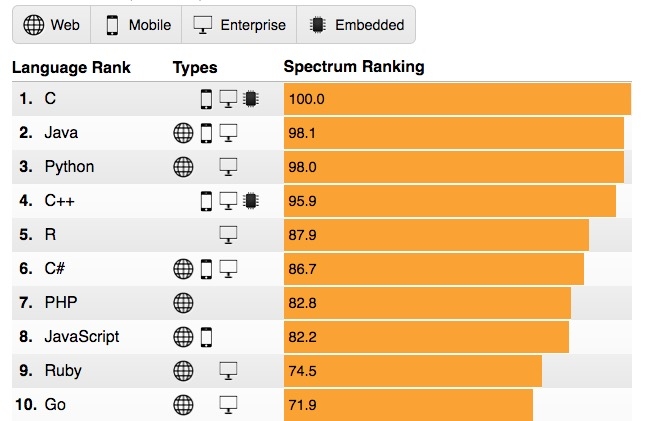The annual IEEE Spectrum programming language feast again came and look at the top ten list released on July 26 this year.

This ranking has been going on for three years. IEEE Spectrum's ranking is a synthesis of 10 important data sources, such as IEEE Xplore, GitHub, CareerBuilder, etc. They provide different perspectives for 48 languages ​​based on data source. Adjust different weights to get different sorting results. The user can even adjust the weight according to his own situation and get the corresponding sorting result. Interested friends can click this link to enter the website to see the results: Interactive: The Top Programming Languages ​​2016.
Let's compare the top ten list of last year and this year (left 2016, right 2015) and look at the trends of this year.

It can be found that C replaced Java as the first place, Python and C++ changed positions, C and R changed positions, and PHP and JavaScript remained in their original positions. In addition, it is important to point out that in 2016, there was a new role in the tenth place: Go, Go was originally ranked 13th in the list last year, and last year's 10th place Matlab ranked 14th in this year's list.
In general, only the top 10 languages ​​are: C, Python, R, and Go.
Looking at the momentum of development in all 48 languages, Nicholas Diakopoulos, who participated in the production of the rankings, stated that the languages ​​associated with big data are generally on the rise, such as Go, Julia, R, Scala and even Python .
The top ten competition on the list is the most intense. Google’s Go’s 19th year ago, last year’s 13th, and this year’s crowding into the top 10, fully demonstrates its growing influence. Diakopoulos analyzed that the rapid increase in Go is related to the increase in usage on Github. According to statistics, the number of original warehouses with Go as the main language on Github in 2016 was four times that of 2014. In addition, there was more discussion on Go in Reddit. Today, Go posts have tripled compared to 2014.
The R language ranking devoted to statistical analysis of data has soared from 13th in 14th to 6th in 15th to 5th in this year. But the most important aspect of the R language is that the number of times it is mentioned in academic research papers has risen significantly. IEEE Xplore is an authoritative database that contains millions of academic papers, industry standards, and monographs. This ranking also places greater weight on IEEE Xplore's data sources. The data shows that only 39 papers in 2015 IEEE Xplore discussed R language. The number of relevant papers this year reached 244.
And Scala rose from 18th the previous year to 15th this year. Julia jumped from 40 last year to 33 this year.
In the weight of the recruitment market, although Java and Python have been dominating the talent market, Diakopoulos said that employers' interest in R and Scala is clearly on the rise. There are only 136 R and Scala related jobs listed on CareerBuilder and Dice in the recruitment website in 2014. However, by 2016, this number has quadrupled to 631.
The list reflects academic and market trends to a certain extent, and readers can refer to their actual situation to plan their academic and career development.
Via IEEE Spectrum
